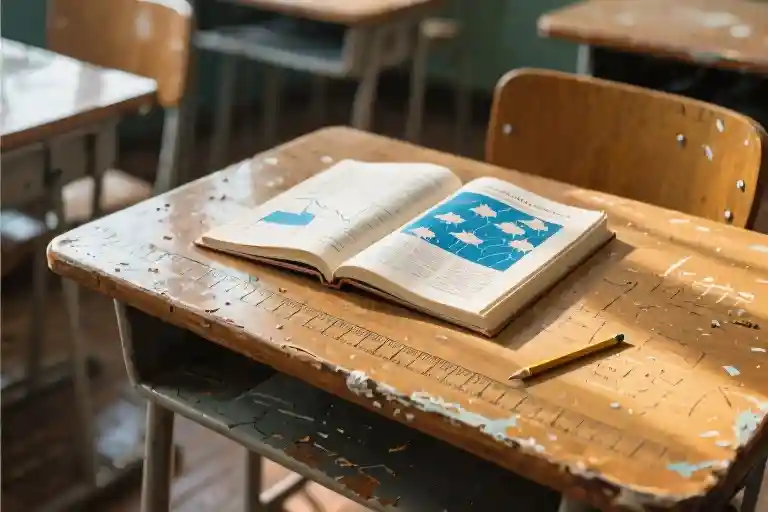If this year were a book sitting on your shelf, it wouldn’t be the pristine hardcover with gilded edges. It would be that well-thumbed paperback with coffee rings on the cover, dog-eared pages marking moments you couldn’t forget even if you tried, and margin notes that trail off into doodles when words failed you. The spine would show creases from being carried through too many long days, and between its pages you’d find grocery lists that became to-do lists that became prayer lists.
2024 wasn’t the year of picture-perfect montages. It was the year of deleted drafts and rewritten paragraphs, of sentences that started strong but wavered midway. Some chapters felt endless; others ended before you found their meaning. There were plot twists you never saw coming, and character arcs that took turns even the most imaginative storytellers couldn’t predict.
Yet here’s what the smudges and scribbles don’t show at first glance: how many times you re-read difficult passages until they made sense. How you kept turning pages when part of you wanted to slam the book shut. The way you learned to find your place even when someone kept moving the bookmark.
This wasn’t a year about neat resolutions or cinematic climaxes. It was the kind of year that teaches you to appreciate cliffhangers – those tense, unresolved spaces where growth happens quietly. Where you discover that ‘getting through’ counts as progress, that showing up constitutes victory, and that sometimes the most important developments happen off the page entirely.
What makes these dog-eared volumes so valuable isn’t their perfection, but their proof: fingerprints where you gripped tighter, underlined sentences that sustained you, and those peculiar stains that will always remind you exactly where you were when life spilled over. These are the editions you’ll reach for years from now, not despite their imperfections, but because of them – because they tell the story of who you were becoming when no one was applauding.
As we stand at the final chapter of this particular volume, know this: some years shine, others strengthen. What 2024 may have lacked in glittering milestones, it made up for in quiet revelations and uncelebrated courage. The plot continues, dear reader – and the best stories always leave room for sequels.
The Dog-Eared Pages
Your 2024 probably wasn’t the leather-bound volume displayed behind glass—the kind with gilt edges and immaculate pages. More likely, it’s that well-thumbed paperback with coffee rings on the cover, receipts sticking out as bookmarks, and entire paragraphs underlined in frantic orange highlighter. The spine cracked in three places where you kept reopening painful chapters.
Maybe your pages show:
- The 2:37am scribbles: When insomnia pinned you under fluorescent bathroom light, rewriting tomorrow’s presentation for the fourth time while your phone charger glowed red like a warning light.
- The smudged ink: Stained by tears during that Wednesday afternoon video call where you muted yourself to cry—just five minutes before calmly explaining Q3 projections.
- The torn corner: That week in March when your child’s fever spiked and your carefully color-coded planner became kindling for survival mode.
These aren’t flaws in your story. They’re evidence of living through what psychologist Angela Duckworth calls “the marathon of the mundane”—those unglamorous stretches where simply continuing constitutes victory.
Consider the tactile details:
- The warped pages from carrying your laptop through three states for a family emergency that left no time for waterproof bags
- The pen marks where you scratched out “5-year plan” and wrote “next 5 hours” instead
- That one pristine chapter—maybe two weeks in July—where everything almost clicked before life intervened again
Neuroscience confirms what your dog-eared year proves: struggle physically reshapes your brain. Dr. Richard Davidson’s research at UW-Madison shows persistent challenges thicken the anterior cingulate cortex—the neural region managing emotional regulation. Each time you:
- Apologized less for saying “no”
- Recognized toxic positivity for what it was
- Let yourself ugly-cry in the shower
…you were literally rewiring your resilience. Not despite the chaos, but because of it.
So when societal benchmarks whisper you’ve fallen behind, touch those creased pages. Run your fingers over the ink smears. These are your emotional calluses—the lived-in texture of a year that demanded everything and still didn’t break you. As author Cheryl Strayed writes in Tiny Beautiful Things: “The useless days will add up to something. The shitty waitressing jobs. The hours writing in your journal. The long meandering walks.”
Your dog-eared pages are the receipts.
Invisible Ink: The Growth You Didn’t See Coming
That coffee stain on your planner from March? The abandoned to-do list crumpled in your desk drawer? These aren’t just evidence of a messy year—they’re hieroglyphics recording a different kind of progress. While traditional milestones might feel absent, 2024 likely imprinted three profound but overlooked growth dimensions in your life’s manuscript.
1. The Quiet Mastery of Uncertainty
Remember those nights rehearsing worst-case scenarios? Your brain was actually building what neuroscientists call cognitive flexibility—the mental muscle that lets you pivot when life derails plans. That startup founder who survived three investor rejections didn’t just endure disappointment; she developed outcome detachment, the rare ability to work passionately while releasing rigid expectations. These aren’t resume skills, but they’re the underground roots of resilience growth.
Growth Tracker:
- [ ] Stopped demanding “perfect” conditions before starting
- [ ] Noticed anxiety spikes without full-blown panic
- [ ] Said “I’ll handle it if it happens” more than “What if…”
2. The Unscripted Lessons
Parenting through tantrums taught you emotional regulation faster than any meditation app. Those months of financial juggling revealed creative problem-solving no MBA program could replicate. Like invisible ink revealed by candlelight, these lessons only become visible when viewed from the right angle—not through the lens of achievement, but through the prism of lived experience.
Consider Mark, who interpreted his job loss as failure until recognizing it forced him to:
- Discover his real passion for teaching (now coaching new hires)
- Develop “scrappy creativity” with limited resources
- Value stability without idolizing security
Growth Tracker:
- [ ] Found unexpected joy in Plan B
- [ ] Learned to trust my gut over textbooks
- [ ] Recognized a strength I’d previously dismissed
3. Micro-Wins That Compound
That morning you walked around the block instead of doomscrolling? That’s neural pathway construction. The time you said “no” to toxic positivity? Boundary-setting in action. Like compound interest, these seemingly insignificant moments accrue into substantial psychological capital. Clinical psychologist Dr. Emily Anhalt calls them “mental health reps”—small, daily exercises that build emotional fitness.
Try This:
- List 5 micro-wins from the past month (e.g., “Texted a friend when lonely”)
- Note what skill each represents (e.g., “Reaching out = vulnerability practice”)
- Spot patterns—these are your developing superpowers
Your Invisible Curriculum
2024 didn’t just happen to you—it happened for you in ways still coming into focus. Those tear-smudged pages? They’re proof you cared deeply. The scratched-out plans? Evidence you adapted. Before turning the final page, try this:
- Trace Your Growth: Highlight three situations where you responded differently than you would have in 2023
- Name Your Lessons: Complete: “This year secretly taught me __” (e.g., “…that discomfort isn’t danger”)
- Honor the Struggle: Write one line thanking your past self for enduring a hard moment
These invisible imprints—your resilience growth, unplanned wisdom, and accumulated micro-wins—are the real margin notes that will illuminate chapters yet unwritten. They’re why next year’s protagonist isn’t the same person who opened this year’s cover.
The Binding Holds: How Tough Times Rewire Your Resilience
Those dog-eared pages of your 2024 story? They’re not just wrinkles—they’re the very fibers strengthening your emotional binding. Neuroscience reveals what wise grandmothers always knew: the years that bend us don’t break us; they teach our nervous systems to weather future storms.
The Neurobiology of Resilience
When you spent nights staring at the ceiling (that third coffee stain on your pillowcase proof of your perseverance), your brain was quietly remodeling itself. MRI studies show that overcoming adversity:
- Thickens the prefrontal cortex – strengthening your emotional regulation like calloused hands handle rough ropes better
- Rewires the amygdala’s threat response – turning panic alarms into cautious notifications
- Builds neural detours – creating alternative pathways around life’s roadblocks
That project that fell apart? The rejection that stung? Each one left microscopic traces—not scars, but survival blueprints. Like tree rings marking dry seasons, your neural networks now contain coded wisdom: You’ve navigated uncertainty before.
Your Hidden Resilience Portfolio
Consider these intangible assets you’ve accumulated:
- The 3am Protocol – You’ve developed personalized crisis management (even if it’s just tea + deep breathing)
- Imperfect Action Muscle Memory – Showing up at 40% capacity now feels more honorable than past 100% performances
- Emotional First-Aid Kit – You can now identify warning signs (tight chest, procrastination) before they escalate
A 2023 Harvard study found people who endured moderate adversity developed 23% stronger stress tolerance than those who faced either constant ease or extreme trauma. You’re in the resilience sweet spot.
From Survival to Strength
Those scribbled-out plans in your year’s manuscript? They became pressure tests proving your binding holds. Remember:
- Every canceled event taught your nervous system that disappointment isn’t fatal
- Each “I can’t do this” moment that turned into “I did it anyway” built anti-fragility
- The days you measured progress in “got out of bed” and “ate one vegetable” were calibrating your comeback scale
Your 2024 wasn’t damaged goods—it was stress-testing. Like leather softened by careful handling, you’ve gained supple strength no pristine existence could provide.
Carrying Forward
As you turn this page, recognize: these experiences deposited resilience compound interest. Next time life shakes you:
- Your body remembers This feeling isn’t permanent
- Your mind whispers We’ve solved harder puzzles
- Your spirit knows Broken-open places heal wider
The binding holds. Not despite the strain—because of it. And that’s the most valuable edition your life library could contain.
Closing the Chapter, Beginning Anew
As you gently close this dog-eared book of 2024—its pages bearing coffee rings from rushed mornings, its margins filled with hasty notes from moments when clarity seemed just out of reach—know this: every smudged paragraph and creased corner carries meaning. These aren’t flaws in your story; they’re evidence of you living it.
The Letter-Writing Ritual
Here’s how to honor this transitional moment:
- Find a quiet hour this week—perhaps early morning when the world feels suspended between years, or late evening when reflections come easiest.
- Address it to “Future Me” with today’s date scribbled in the corner like a secret code between past and future selves.
- Write three truths this year taught you—not grand philosophies, but simple, hard-won realizations (“I now know exhaustion looks different from failure,” or “Tears water resilience like rain does seedlings”).
- Include one kindness you wish you’d shown yourself sooner (“You deserved that canceled weekend just to breathe”).
- Seal it with a promise—not a resolution, but a permission slip (“In 2025, I give myself leave to…”).
The Binding Still Holds
Notice how the spine of this year’s volume, though strained, remains intact? That’s your resilience—tested but unbroken. Neuroscientists would tell you each struggle has rewired your brain’s stress response, creating what researchers call “psychological antibodies” against future challenges. You’ve literally grown stronger at the broken places.
Your Next Blank Page
When you open that fresh journal on January 1st, remember:
- First lines needn’t be profound—some of history’s greatest stories began with hesitant scribbles.
- Plot twists aren’t disruptions—they’re what make narratives worth reading.
- Your hand might shake sometimes—that just means you’re writing something real.
As this well-worn book joins your life’s library, run your fingers over its textured cover one last time. The slight warp from that month of rainstorms? That’s where you learned to dance in puddles. The wrinkled chapter around midsummer? Where you discovered grit tastes like salt and determination. These aren’t damages—they’re the topography of a year lived authentically.
Now place it on the shelf, take a deep breath, and reach for the blank volume waiting beside it. Its crisp pages smell like possibility and fresh ink. Whatever comes next, you’ve already proven the most important thing: you’re the kind of person who keeps turning pages, even when the story takes unexpected turns. And that makes all the difference.





